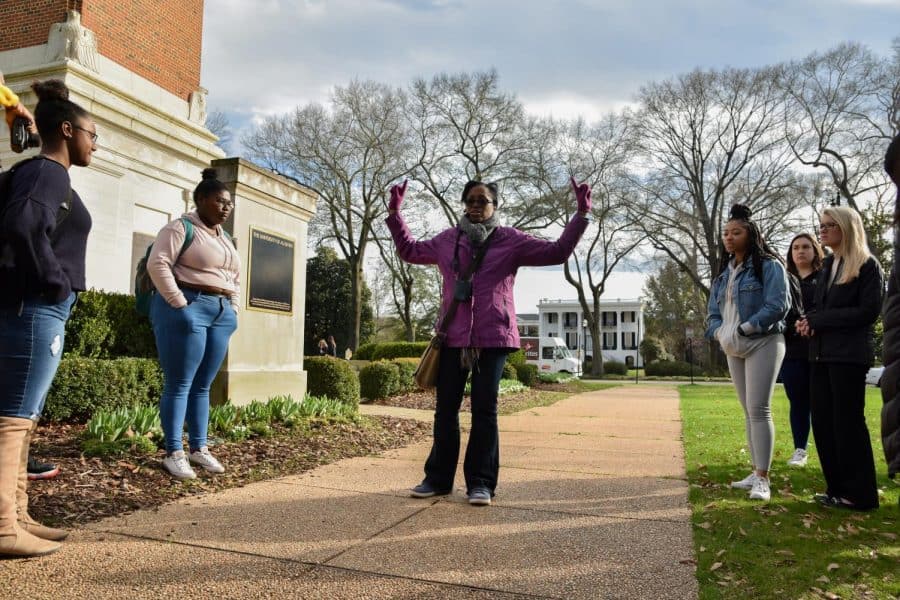Autherine Lucy Foster award honors African American leadership
Hilary Green created and hosts “Hallowed Grounds” tours, which expose the University’s ties to slavery. CW/ Hannah Saad
April 8, 2019
The Black Student Union (BSU) and Black Faculty and Staff Association awarded the 2019 Autherine Lucy Foster Award to Imani Williams, a student at The University of Alabama majoring in public health with a concentration in education promotion, and Hilary Green, associate professor of history in the Department of Gender and Race Studies, on March 24.
Autherine Lucy Foster was the first African American student to enroll and attend The University of Alabama on Feb. 3, 1956. After three days of enrollment, Foster was expelled due to violence on campus and threats to her safety.
The award is given annually at Black Scholars Day to one student and one faculty or staff member who have made a significant contribution to the University through leadership, service and support for minority student programming. Black Scholars Day is a day to recognize the scholastic achievements of African American undergraduate students who have earned a cumulative GPA of 3.3 or higher at the end of the fall semester.
Darnell Sharperson, a public relations major and president of BSU, said the award is a way of keeping Foster’s legacy alive at the Capstone.
“We’re proud to honor the legacy of Autherine Lucy,” Sharperson said. “We like to make sure we are continually and consistently making and keeping her presence and honor known on campus.”
Members of BSU and Black Faculty and Staff Association nominate students and faculty and staff members that they think are deserving of the award. The nominations are then reviewed and put to a vote.
Green has worked at the University for five years and teaches classes on early African American history, Civil War memory and identity and women’s history.
Green developed the Hallowed Grounds Tour, which explores and details the lives and experiences of the enslaved men, women and children at the University from 1829 through 1865.
“Autherine Lucy Foster was a major pioneer who shifted the campus from a history grounded in the treatment of African Americans as property to be able to come here as students,” Green said. “Her pioneer status, bravery and perseverance paved the way for me to be at the University, and having this award given to me is something meaningful. It came as a complete surprise, and I’m just honored to receive it.”
Sharperson said Green’s work on the Hallowed Grounds project has been notifiable over the last few years and is important in preserving the history of African Americans at the University.
“Dr. Hilary Green has made such an impact not only on our campus, but also on a national scale,” Sharperson said. “We really feel this is very important to make sure that the legacy and history is definitely conversed about when we talk about the history of the University and ensuring that students of color are not invisible when we talk about the history and how far we’ve come, not only on campus but within our state.”
Williams is involved in the Alabama Student Association for Poetry, works as a director and in production at WVUA and has her own radio show.
“One of the reasons we chose Imani Williams is just the undeniable talent she has,” Sharperson said. “Over the last one or two years, her presence with the Alabama Student Association for Poetry has led us to be more reflective on our community and be proud of where we’ve come from and how far we can take our talents. She’s always there to support at all of our programming and she definitely has a great presence as a leader for the students of color on campus.”
In the future, Williams said she wants to produce a TV show, expose more people to poetry and increase the University and community’s investment in art.
“I’m still in shock, still trying to process winning the award,” Williams said. “From what I understand, the impact Mrs. Foster made on campus was not just about in the classroom, but the community and nation.”











